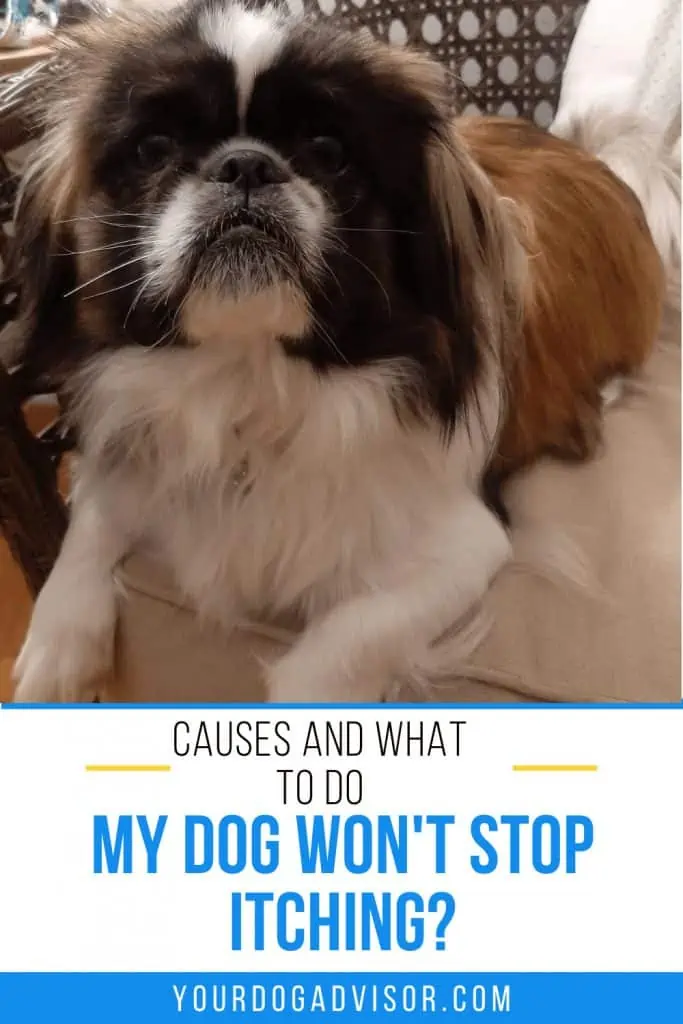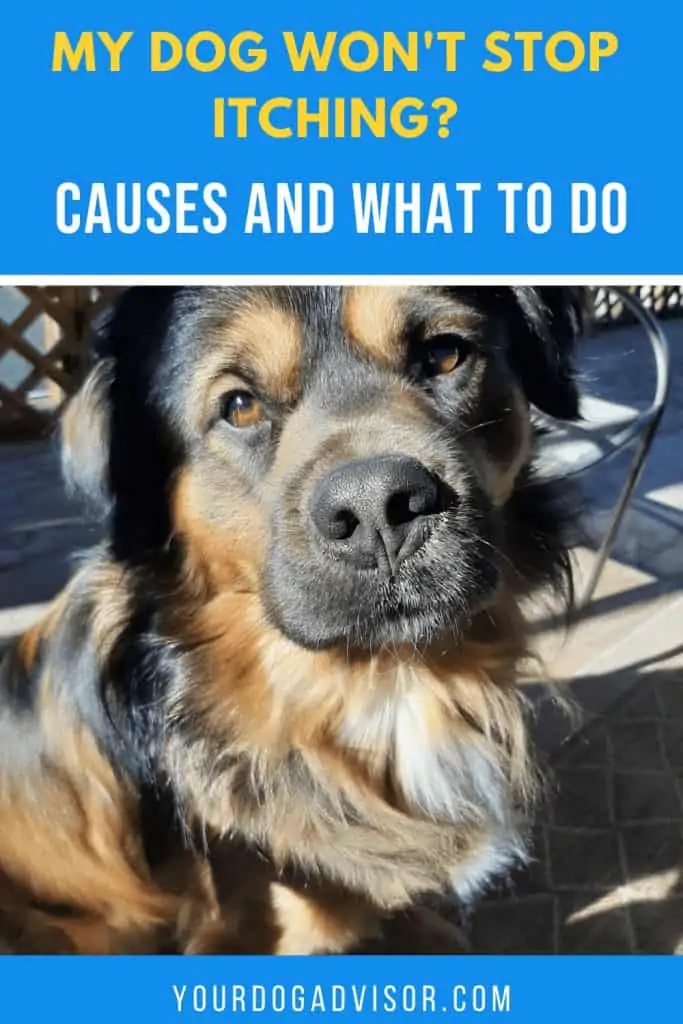A constantly itchy dog can be worrisome. An inch every once in a while is fine. We all get them. But when it becomes a constant irritant and disturbance for your furry friend, it’s a problem.
Itching in dogs can be a pain to diagnose because of the many potential causes. It could be an allergic reaction to a new food, something sprayed on the grass in your residential area, fleas, or many other things.
If you notice your pup’s consistently itchy and scratching, it’s important to narrow down the cause.
It’s especially important to pay attention if your pup is scratching or picking at themselves to the point of hurting themselves or they just can’t seem to relax.
If you think their itching could be a sign of a larger problem or nothing is working, go ahead and call the vet and make an appointment.
Contents
Allergies
Allergies can be a pain for anyone, regardless of whether they’re human or animal. Many of us suffer from different allergies and they can cause different problems.
Certain allergic reactions can cause itching in your companion. It could be seasonal allergies, an ingredient in their food, or something you’ve been putting on their skin.
Allergies caused by pollen, insect bites, or other factors can cause itchy skin.
Skin Allergies and Irritations
Many triggers may cause an allergic reaction to your pup’s skin. Pollen, insects, plants, and many other outside factors can trigger them.
Dogs suffering from skin allergies may suffer from constant itching along with constant grooming and licking, sneezing, watery eyes, rashes, or inflamed skin.
If you’re unsure of what’s causing your pup’s allergic reaction, you may need a vet’s help. They can run a variety of skin tests to determine what’s triggering them and how to treat it.
Your pup can also suffer skin irritations from wearable garments like collars, harnesses, or the cute dog shirt you bought at the pet store. If they’re scratching right after getting a new wearable item, it may be causing skin irritation.
Food Allergies
If your pup suddenly starts scratching after a recent food or treat change, the food change is likely the cause. There could be an ingredient that their system just can’t handle properly. Like humans, certain dogs have allergies to certain foods.
For example, our Pekingese started scratching at herself when we gave her chicken-based foods when she was a puppy. When we banned chicken from her diet, the scratching calmed down.
A food allergy for a dog may cause irritated skin patches around the stomach, eyes, rear, ears, or paws. They may also throw up or have diarrhea in more serious cases. In severe cases, they may have facial swelling, in which case I would head straight to the vet.
Food allergies can be a pain to determine, and it’s best to consult your vet for advice if it’s not obvious what caused it. There are allergy tests they can run.
They may also recommend an elimination diet where you eliminate treats and foods from their diets to determine which food is causing their discomfort.
Environmental Allergies
Dogs can suffer allergies from their surroundings just like us. Dust mites, mold, pollen, dander, and other things can be considered environmental. While these allergies are known more for causing respiratory issues, they may cause itchy skin as well.
Make sure you try to keep your house reasonably clean of dust and mold for both of your sakes. When cleaning, make sure you’re using a pet-friendly floor cleaner to avoid an allergic reaction to the cleaner.
Keep the AC running in the summer, and wipe your pup off when they come inside, especially if the grass outside was just sprayed with anything.
Dogs can suffer allergic reactions to certain things in their environments like dust and mold.
Parasites
Parasites are probably the scariest possibility for your companion’s itching, and one you want to eliminate right away. Not only can they harm your furry friend, but they can also potentially jump on you too.
Make sure you’re checking your pet for parasites periodically and investing in preventatives.
Fleas
Fleas are the most well-known parasite when it comes to dogs. They’re infamous for causing itching and discomfort in pets. They reproduce quickly and can easily jump from animal to animal (including humans). If you suspect your companion has them, you need to act quickly.
Make sure you keep hypogenic flea shampoos and other flea eradicators on hand. Don’t ever assume it can’t happen to your dog, no matter how careful you are.
If you suspect they have fleas, go ahead and bath them with a flea-killing shampoo to eradicate as many of the little demons as you can. Then use a flea comb to remove any remaining fleas and anything they left behind. Pay special attention to their neck and back legs.
No products found.
Once you’ve confirmed your pup has or had fleas, go ahead and take them to the vet. They can recommend any needed medications and make sure they are gone.
Watch out for Flea Allergy Dermatitis if your pup seems to be obsessively grooming, restless, or if they’re emitting an unusual odor. This condition is an allergic reaction to flea saliva. Vets can prescribe medications for it.
Fleas are a pain, so make sure you’re taking preventative measures in advance to try to prevent them. Get your pup their flea shots, get a flea collar, check them regularly, whatever it takes.
Fleas are infamous for causing itching and discomfort in dogs, and they can potentially spread to humans if not dealt with.
Lice
While lice aren’t very common in dogs, it’s still worth looking out for. Some lice can be passed between dogs, and they may cause your pup to experience hair loss along with itching. There are lice shampoo and topical treatments for lice.
If you notice your pup suffering from hair loss and scratching, take them to the vet to get help if needed.
Mites
Mites are potentially dangerous because certain mites can cause a condition called mange. This condition is contagious even for humans and can cause inflamed or shabby skin and loss of fur along with intense itching.
If you suspect your pup has mange, get them to the vet quickly to diagnose it and get treatments.
Dry Skin
If your pup’s scratching is getting out of control, check their skin and see if it’s dried out. Dry skin can cause itching just like it can with humans. It can also be a symptom of a problem like parasites or allergies.
Dry skin can also be caused by things like overbathing, certain soaps, or weather conditions. Poor nutrition can also cause dry skin. Make sure you’re feeding your pup a balanced diet including fatty acids.
You can tell a dog’s skin is dry if it’s flaking, scaling, inflamed, or if your pup is suffering hair loss, dandruff, or pimples.
Dry skin in dogs can be treated in several ways. If you suspect that their diet is causing the problem, you can try adding more fatty acids to their diet through supplements.
If the air outside and in your house is dry, you may want to consider buying a humidifier. Air moisture can help dogs maintain healthy skin and coat conditions, and dry air can cause the skin to dry out. Keeping a humidifier can help the humans in your household too, so everyone wins.
No products found.
If you’re having trouble getting your pup’s dry skin under control, don’t hesitate to get help from a vet. Dry skin can potentially be a symptom of a larger problem.
Infections
Various types of infections can cause your pup to scratch at themselves, and it’s important to find an infection quickly.
Bacterial infections and fungal skin infections can cause serious discomfort for your pet. Yeast infections are a common example of an infection that causes serious itching and discomfort. Dogs may suffer from greasy or scaly skin, swelling, and a distinct odor.
Watch what areas your companion is scratching and chewing at. They could be suffering from a yeast infection, or another issue like an ear infection. If you suspect that they’re suffering from an infection of any kind, take them to the vet for medications.
Don’t wait too long to call a vet if your pup has an infection. Many of them require antibiotics and a cone to prevent your pup from scratching during recovery.
Infections can cause itching and may require antibiotics to cure.
Remedies
While it all depends on the exact cause, there are multiple remedies out there for an itching dog.
While some of these can help alleviate the problem, they aren’t a substitute for a vet visit if the scratching becomes a serious problem.
Antihistamines
People often recommend antihistamines for treating dog allergy issues. Benadryl specifically is the go-to medication for some pet owners. The dosage may depend on dog size.
My family has occasionally given our Pekingese a half-pill of Benadryl to combat allergies and seen some success. That said, you should always consult a vet before giving them any human medication.
Baths
If you haven’t bathed your pup in a while, consider giving them one, even if they hate it at first. Good hygiene can be a good preventative and soother for itchy skin.
Make sure you have a good shampoo for your pup, especially if they’re prone to skin issues. A flea preventative shampoo or dry skin soother may help.
No products found.
At the same time, don’t bathe them too often. Overbathing can dry out their skin depending on the breed. Know your dog’s breed and condition and only bathe them as needed.
If you notice that the itching is actually worse after a bath, consider switching shampoos. There may be an ingredient in your current shampoo that they’re allergic to.
Store-bought Remedies
There are many over-the-counter remedies you can buy to help your companion if they’re constantly scratching themselves. You can buy itch relief sprays if you know where your pup’s problem is located.
No products found.
You can also try giving your pup chewable supplements for allergy relief. These may not immediately solve the problem, but they can help in the long run.
No products found.
See a Veterinarian
If you can’t figure out what exactly is causing your dog’s itching or you think it’s a serious issue like an infection, go ahead and call the vet.
Even if it’s not a serious issue like parasites or infections, your vet can help you determine what exactly is causing their discomfort with skin tests and other tests and if necessary prescribe medications.
Don’t hesitate to take your dog to the vet if you can’t pinpoint a specific cause of their itching or you think it’s a larger problem.
Address Your Dog’s Itching Quickly
Itching happens occasionally and isn’t something to worry about if it’s just an occasional issue. But constant itching, scratching and licking means that your dog is suffering from something. And they can potentially hurt themselves doing it if it drives them crazy enough.
If your pup is constantly scratching at themselves, it’s best to assume that something’s wrong and find the cause. It can be difficult because there are so many different causes, but if all else fails the vet can run tests to help narrow it down.
If you notice that the itching occurs after a change in diet or shampoo products, it’s best to look at the ingredients and determine which ingredient is different, and not use anything with those ingredients again. Same with any changes in wearable items and any other pet products.
If it’s not obvious which ingredients are causing the problem, an elimination diet may be needed to narrow down which ingredients trigger reactions.
Pay attention to what’s in your furry friend’s surroundings, including seasonal things like pollen, what’s in the grass, what’s in your house, pet food, and other pet products. If your pet is suddenly scratching at themselves, look at what’s recently changed.
Never hesitate to reach out to the vet if you can’t solve your pup’s discomfort on your own. If sprays, baths, and other remedies aren’t helping, a vet may need to run tests to diagnose the real cause and what to do about it.


Jen Jones is a professional dog trainer and behavior specialist with more than 25 years of experience. As the founder of ‘Your Dog Advisor’ and the ‘Canine Connection’ rehabilitation center, she applies a holistic, empathetic approach, aiming to address root causes rather than merely treating symptoms.
Well known for her intuitive and compassionate approach, Jen adopts scientifically-proven, reward-based methods, encouraging positive reinforcement over punishment. Jen specializes in obedience training, behavior modification, and puppy socialization. Her innovative methods, particularly in addressing anxiety and aggression issues, have been widely recognized. Jen has worked with many of the world’s leading dog behaviorists and in her free time volunteers with local animal shelters and rescue groups.





